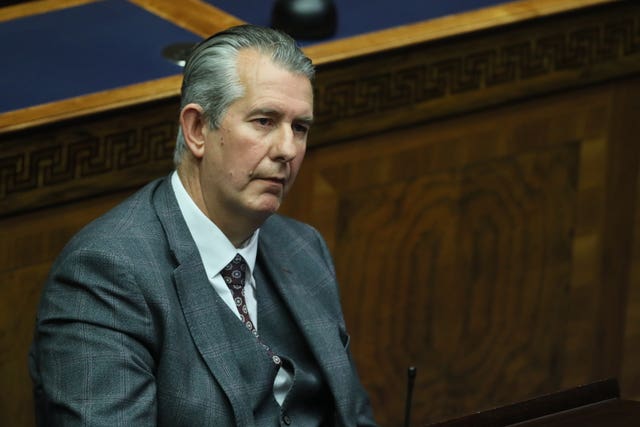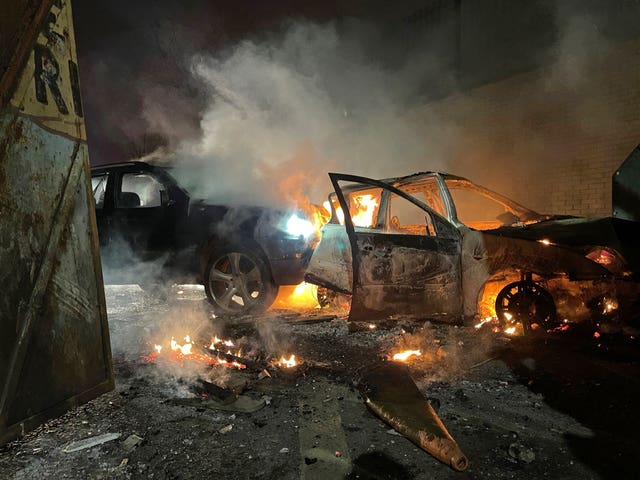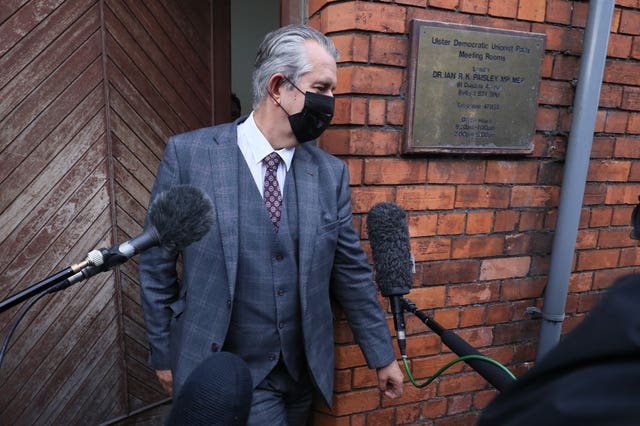Outgoing DUP leader Edwin Poots has expressed fears of serious loyalist paramilitary violence in Northern Ireland this summer if Irish Sea trade barriers are not removed.
Mr Poots, who was ousted in an internal party revolt last week, also said he would have been prepared to collapse the powersharing institutions at Stormont next month if changes were not secured to the contentious Northern Ireland Protocol.
However, the Lagan Valley MLA, who was forced to quit after just three weeks in the job, conceded that if there was a snap Assembly election – a consequence of collapsing Stormont – Sinn Fein would currently be likely to displace the DUP as the largest party.
In response, Sinn Fein President Mary Lou McDonald said talk of abolishing the Protocol was “not grounded in reality”.
The Protocol, which has created barriers on trade between Great Britain and Northern Ireland, was agreed by the UK and EU as a way to maintain a free-flowing land border on the island of Ireland post-Brexit.
The arrangements are fiercely opposed by many loyalists and unionists, who believe they are undermining Northern Ireland’s place in the UK.

Mr Poots claimed that violence that erupted in several loyalist areas in April, in part over anger at the Protocol, was mainly confined to young people with no paramilitary links.
In a wide-ranging interview with BBC Radio Ulster’s Nolan Show, he warned that the paramilitaries may get involved if violence was to flare again in the summer.
“In terms of where loyalism is at this moment in time, I think what you would have witnessed earlier in the year was largely young loyalists who were not connected to parliamentary organisations,” he said.
“I fear that if things don’t change over the course of the summer time, that perhaps some older people who are involved in paramilitaries will get involved.
“That’s my fear – that if we do not resolve things politically, the street politics will become the focus and street politics has the potential to lead to violence and therefore it is incumbent upon us to ensure the politics works, and a failure of politics has the potential for a significant problem in our community, which could lead to people being hurt, and we should really try to avoid that.”

Asked if he thought there was the potential for paramilitaries to engage in serious, premeditated violence, he said: “I think there is that potential.”
Mr Poots tendered his resignation last week after a significant majority of DUP MPs and MLAs voted against the terms upon which he decided to re-enter the devolved Stormont executive in Belfast alongside Sinn Fein.
They were angered that Sinn Fein had managed to secure a commitment from the UK Government to legislate for protections for Irish language speakers at Westminster as a precondition for it reconstituting the administration following the resignation of former DUP leader and First Minister Arlene Foster.
Mr Poots said he pressed ahead with nominating a new First Minister – constituency colleague Paul Givan – because to collapse the Executive would have undermined his efforts to secure changes to the Protocol.
He has claimed the UK Government has given him assurances that major changes to the Protocol will be announced in early July.
“If I have lost my leadership but have taken the steps which will ensure that we get a result on the Protocol, and therefore the Northern Ireland constitutional issue isn’t damaged the way that has been, then that’s been worth doing and that’s worth the sacrifice that I’ve made,” he said.

The departing leader said he would have been prepared to pull Mr Givan out of the Executive next month, thus collapsing powersharing, if those changes did not materialise.
Mr Poots said he made clear his intention at a meeting of DUP party officers in Belfast last Thursday where his fate was ultimately decided.
“It wasn’t enough,” he said, suggested the officers would only be content if he resigned.
The outgoing leader said the officers were not prepared to give him space to articulate his intentions to the wider party and he was presented with little alternative other than to quit that night.
He pointed out that a majority of the officers were supporters of Sir Jeffrey Donaldson – the man he defeated in last month’s leadership contest and who will now succeed him as DUP leader.
“It was made clear to them (the party officers at the meeting) that over the course of July if we don’t get what is indicated, if we don’t get the success that we have been working on, then I will be looking at pulling the First Minister out as well,” he said.
Mr Poots said he was “publicly eviscerated” last Thursday, suggesting he was taken down by “big beasts” within the party.
He added: “Leadership is about taking risks and I took a risk to run for the leadership and I took a risk to maybe take on some of the big beasts in doing that and then, obviously, some of the big beasts decided to have another go in that circumstance.”
On the prospect of a snap election, Mr Poots said: “The unionist community is pretty disenchanted with politics and has been for some months now, and therefore getting the significant win on the Protocol is necessary to turn that situation around.
“I think if there’s an election today, and thankfully there isn’t, it wouldn’t be a good election for unionism.”
Asked whether Sinn Fein would be likely to emerge as the largest party and holder of the First Minister’s position, Mr Poots added: “They probably would have the largest number of votes and seats as things stand.”
In a speech to party members in west Belfast on Wednesday, Mrs McDonald claimed the DUP’s approach to the Protocol was out of step with the wider public, including many unionists.
“The DUP will be making another political error if they seek to endanger the political stability of the institutions over the consequences of the outworking of their Brexit policy.”
Mrs McDonald added: “Talk of abolishing the Irish protocol are not grounded in reality. Good faith engagement and use of the Joint Committee is the only mechanism to address challenges and difficulties.
“Solutions can be found and we see evidence of that today, but let me be clear: We need the protocol because Brexit is bad news for Ireland and for the north in particular.
“The DUP need to work alongside the rest of us to meet the challenges and maximise the opportunities of the Irish protocol. Businesses want the protocol to work, and they expect their political leaders to work together to deliver on solutions to the practical challenges they face.”




Comments: Our rules
We want our comments to be a lively and valuable part of our community - a place where readers can debate and engage with the most important local issues. The ability to comment on our stories is a privilege, not a right, however, and that privilege may be withdrawn if it is abused or misused.
Please report any comments that break our rules.
Read the rules here